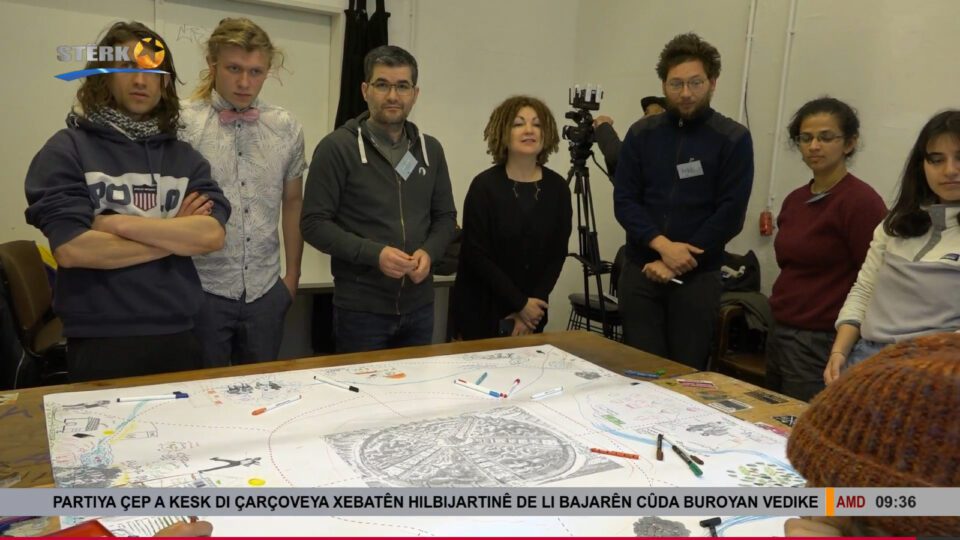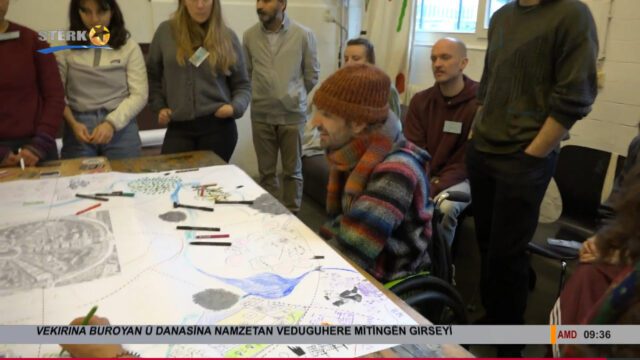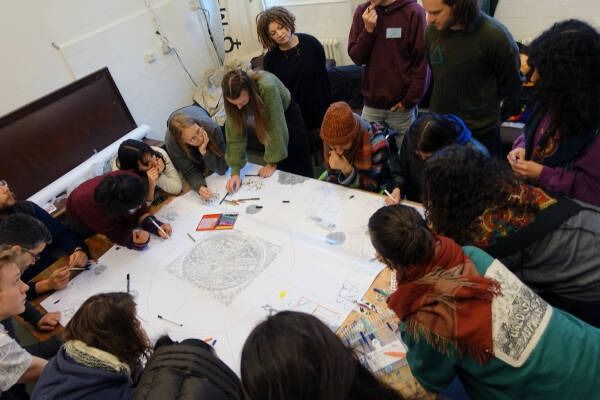
The 4th edition of the conference series Challenging Capitalist Modernity was held in Hamburg, Germany, on March 8th, 2023. Under the framing title We want our World back it focused on the arts, education, and the construction of democratic confederalism.
What is the objective of the Anthropology for Kids project, and how was it initiated?
I began A4Kids fifteen years ago after meeting my late husband, David Graeber, as he is the one who actually introduced me to the discipline of anthropology. In that sense, I learned anthropology like a child learning about the world from an adult. Eventually the project grew out of that relationship.
Throughout its existence, A4Kids has taken different forms, including interactive books and the format of an in-person workshops series, for instance. But the purpose has always remained to introduce children to the various ways in which essential social institutions such as Family, City, Museum and so on, have been perceived in different cultures and at different times. A4Kids invites its readers and participants into a creative process, asking them to imagine new ways of organizing and ordering society around the values they hold dear.
Originally, I imagined the project to be less of a product and more of a community-oriented educational tool. I thought I would create doodle books, notebooks, or some sort of collective drawing practices. Something that can be easily integrated into the everyday life of a parent taking care of their kids would look like a play and doesn’t require lots of resources—something of the equivalent of singing songs together. However, that was proven to be very difficult to pitch to publishing houses, and so David and I began adapting the project from doodle books to more traditional educational books. The doodle designs are still available for download from our website a4kids.org.
Another project which was born out of the initial idea was the City of Care Assembly, which David and I designed together during the Covid-lockdown in London. This time, we were working with our adult friends from the art group and environmental movement Extinction Rebellion. We draw on the pavement with chalk and visualized urban social alternatives together by literally drawing onto the city.
Ever since we have organized lots of international A4Kids workshops with people from different cultural, economic, age and social backgrounds: from 6–7 year old kids from Havana to teens from central London, from homeless 18–20 year old kids from Berlin to Romanian teens from Timișoara. Even though the groups were very diverse, one aspect that remained the same throughout the participants was the gender dynamic: while all of them being very different groups they still showed a similar behavior pattern of assuming gender roles. The moment when children would start to invent social scenarios, boys in almost every country would start building robot factories to kill their enemies. They would fantasize about taking over the city, building roads in a way that would either cut off supplies from one part of the city or protect the city from future attacks. From the very beginning until the end of the workshop, most of the boys would engage in warfare. In contrast, the girls would look for ways to provide care. They would say, “Okay, looks like it will be a war. So probably there will be wounded people. Let’s build a hospital.” or “We should make a community garden and a school for our future kids.” So, if they would build a factory, it would be something like a toy factory. Only in Iceland, a country with an inspiring feminist history, the girls chose to take over a part of the city and state in order to not adapt to the rules created by boys, but to make their own.
A4Kids participated in the conference Challenging Capitalist Modernity. How did the participation come about?
Anthropology promises an incredible opportunity to examine our own society through the prism of other cultures. A4Kids emerged as an experiment in the creation and dissemination of non-academic and egalitarian knowledge with a focus on hands-on learning or learning by doing.
The invitation to participate in the conference was very personal, as David and I were friends with the organizers. David did his best to help the most important revolution since the Spanish Civil War, in which his father was involved, the social and political transformation in Syrian Kurdistan.
People from different countries attended the conference: from Mexico and the Amazon forest, from Northern Kurdistan itself and from the United States, from Germany and from France. They all spoke about the possibility of living in another world. The common attitude towards the climate crisis, wars and injustices is that they are not inevitable, but depend on our own choices.
Personally, I found the panelists’ talks very impressive. I would even say it lifted my spirits, because in recent years the news has been more than depressing, and here you are, talking to people who are actively working to create zones of freedom and care around the world.
Shortly before leaving London for the conference, I learned that, at the request of the German Secret Police, the University of Hamburg had refused to hold the event. This inevitably leads to a conference having to be canceled. After all, such events take a long time to prepare. Usually, everything is arranged in advance, and it is impossible to coordinate the infrastructure and logistics last-minute.
The intervention of the secret police in the affairs of the independent university sparked outrage among the conference organizers and supporters, including many famous academics and public intellectuals, like Naomi Chomsky and Silvia Federici. The university students showed courage and unity as well.
Through a collective effort, organizers succeeded in making the conference happen in just a few days.
As is often the case, the attempt to destroy solidarity, to frighten activists, led to the opposite result: an upswing in solidarity and enthusiasm.

How was the practice and agenda of Af4Kids embedded at the conference?
My experience of running the A4Kids workshop at the “Challenging Capitalist Modernity” conference was unlike any other I had in the fifteen years of running this project.
Participants were from all over the world: Kurdish, Germans, English, Indian, people from the Balkans and Rumania among many others. While coming from different places, they shared a lot and already had a common language. It felt like people knew each other for a long time. Thus it was easy to collaborate and people supported each other in developing collective ideas. They collaborated on creating equal living conditions in the imagined city, and devised collective food production processes, for instance. The whole group took into account the one participant who was handicapped and proceeded to include the special needs of disabled citizens into their urban planning.
Personally, the thing that struck me most was how the issue of security was almost immediately at the center of the group’s discussion. David Graeber admired how in Rojava collective safety became an integral part of the society rather than an outside force set up to police the society itself. David described how there were almost no traffic police, but instead, it was adults watching out that kids would not try to drive cars, and apparently the street traffic was pretty safe.
In this particular workshop, participants began creating their imagined city by building a river. While talking about the city’s police, participants of the workshop suggested that the police will consist of a group of citizens who stay in a boat floating on the river, visiting different parts of the city and constantly being replaced in each district by locals. In this way there would be no autonomous police force, but a kind of civilian neighborhood help squad. This way the population would always remain in control and the police would only exist for the society’s protection. I thought that was a brilliantly smart and well thought-through security design. There were numerous other clever ideas, for example, a girl from India combined a food cooperative with an art space for women. The children created an assembly in which they could collectively decide how to proceed with designing the city center. My experience with this workshop was like an incredible lesson in creating a city, where on the one hand, the guarantee of each citizen’s freedoms and safety was thought out in detail, and on the other the collective rights of the entire city and its commons kept intact. Even though I was supposed to lead this workshop, I didn’t do much. I just watched as this group of people created a caring, communal city. Some might describe what I saw as utopian, however, I do not think that is true. Indeed, in the other workshops I often saw that children didn’t know how to create a solution to possible problem in common space, such as a city, they would come up with dystopias based on dark fantasies and fears, or on the dystopian scenarios that the horror-obsessed media provides us with.
After all, any zombie apocalypse movie is a fulfillment of Thomas Hobbes’ utopia with its ideas about the true nature of man as “war of all against all.” It is surprising that a man with such frankly inhuman ideas about human beings became the founder of the political design of the society in which we live. That’s why it’s not at all surprising that we are taught from childhood that the world is horrible and dangerous and that only the government can save us from ourselves. People in Hamburg were like a group of engineers, extremely rational and detail-oriented. I kept thinking that when a real catastrophe unfolds, I want to be with this group!
This impressive solution-focused way of thinking was also present in the way the conference organizers handled the event. When the conference was canceled in just a few days because of the advice of the secret German police, the organizers of the conference had to find a new place for the event, and find locations for all workshops. This is a massive logistical task. Such events are usually prepared by professional logistics management companies. Just imagine: hundreds and hundreds of participants, dozens of workshops, translations into many languages, everyone had to be fed, distributed, guided, provided with instructions on how to get around Hamburg and so on. The organizers managed everything within a few days. There were no logistical glitches.
Just as the people at the A4Kids workshop approached the task of planning a city with care and trust in each other and the result was a ‘City of Freedom and Care,’ just as my late husband David Greber and I had dreamed of. Perhaps such cities already exist somewhere, and it is possible that more and more will spring up, and I want to believe that we ourselves may be able to live in one on them.
